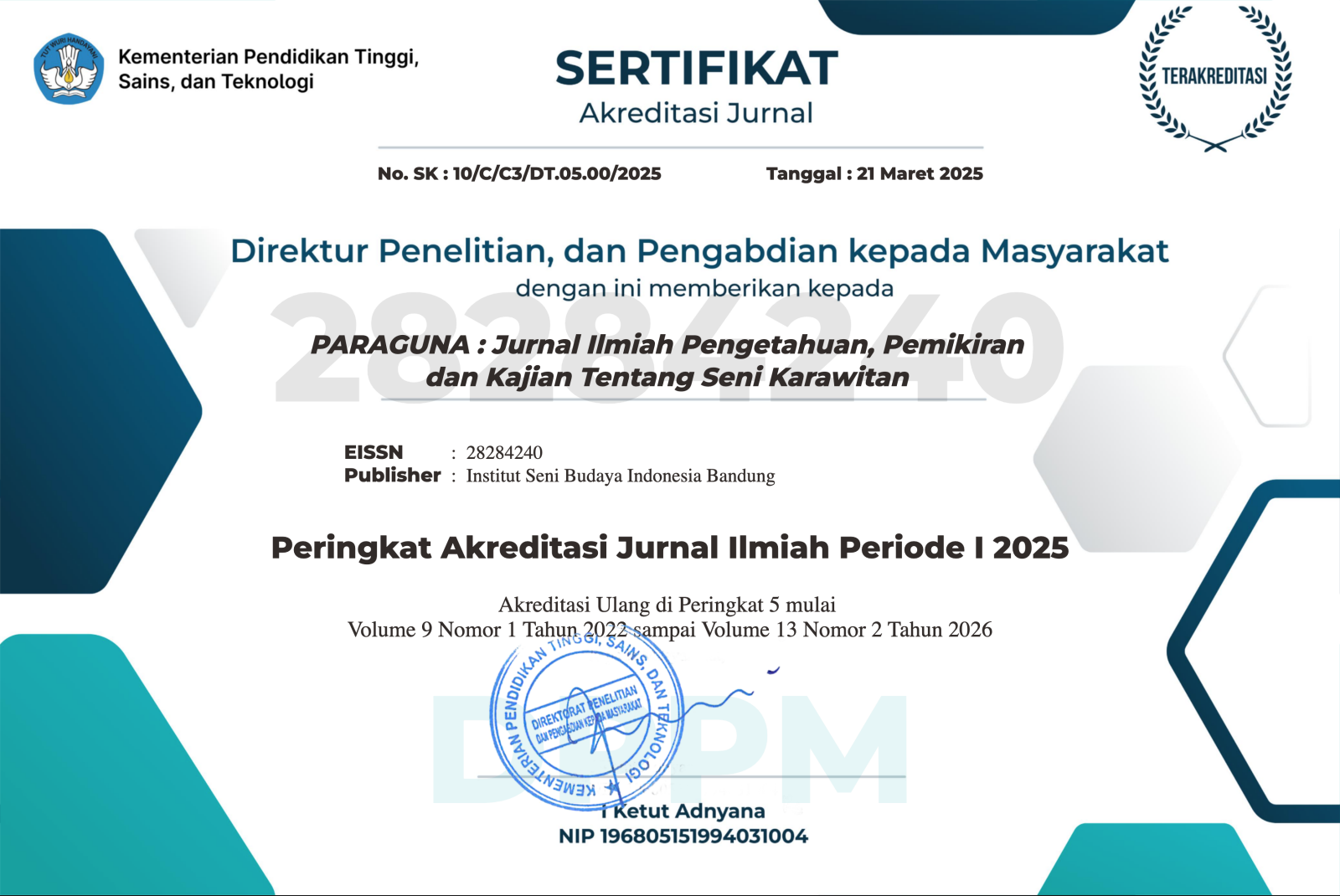KONSTRUKSI MAKNA ISTILAH DALAM GARAP REBAB SUNDA
DOI:
https://doi.org/10.26742/jp.v4i1.1873Keywords:
Construction, meaning, term, rebab, SundaneseAbstract
The terms applied in working on playing the rebab in Sunda certainly appear after the musical form. In fact, the terms also mostly use terms that are considered to be the closest to reality both audio and visual. However, there are a number of other terms which are based more on things outside of reality, so that the construction of the meaning of these terms contains messages far beyond the technique. The problems in this study are: (1) What are the meaning constructions that underlie the creation of terms in the Sundanese rebab work? (2) What is the correlation between the terms that are built with the form of Sundanese rebab musicality? The purpose of this study is to find out, understand and explain: (1) the construction of the meaning of terms in the Sundanese rebab, (2) the correlation of terms with their musicality. Data collection techniques used were participant observation, interview and documentation study. Data analysis is carried out by identifying, reducing, clarifying, describing, interpreting and concluding all information selectively. The results of the research show that: (1) the terms used in the rebab play are two categories of terms, including terms with denotative conceptual meanings, and terms with connotative meaning concepts, (2) The technique of playing the rebab requires accuracy, precision, and interpretation. Therefore these terms are used as methods and strategies in the process ofinheritance.
References
Abdullah, lrwan. 2007. Konstruksi dan Reproduksi Kebudayaan. Yogyakarta: Pustaka Pelajar.
Cassirer, Ernst. 1990. Manusia dan
Kebudayaan: Sebuah Esei
Tentang Manusia. Di Indone• siakan oleh: Alois A. Nugroho. Jakarta: Gramedia.
Haryadi, Frans. 1975. "Musik Dahu• lu, Kini, dan Hari Esok". Makalah dalam Festival Musik Nusantara.
Humardani, S.D. 1974. "Membina Kritik Musik". Surakarta: Pengembangan IKI, Sub ASKI Surakarta.
Jajuli, M. 2001. Paradigma Seni Per•
tunjukan. Yogyakarta: Lentera.
K.M, Saini. 1982. "Nilai Lama dan Nilai Baru dalam Kesenian Daerah Jawa Barat", Sebuah Artikel. Bandung: Panitia Pelaksana Pasamoan Kebuda• yaan Wilayah Jawa Barat.
Lindsay, Jennifer. 1991. Klasik, Kitsch, Kontemporer. Yogya• karta: Gadjah MadaUnivesity Press.
Nooryan Bahari. 2008. Kritik Seni Wacana Apresiasi dan Kreasi. Yogyakarta: Pustaka Pelajar.
Setia, Dana. 1988. "Musik Sunda dalam Perspektif Pariwisata". Bandung: Artikel
Sumardjo, Jakob. 2000. Filsafat
Seni. Bandung: Penerbit 1TB.
Suryalaga, Hidayat. 1998. "Menyi• mak Daya Tarik Musik Sunda dari Tradisi Ke Kompetitif'. Bandung: Sebuah Artikel.
Suryana, Tatang. 1980. "Perkemba• ngan Kreativitas dalam Kara• witan Sunda". Bandung: Sebuah Artikel.
Downloads
Published
How to Cite
Issue
Section
Citation Check
License
- Authors retain copyright and grant the journal right of first publication with the work simultaneously licensed under a Creative Commons Attribution License that allows others to share the work with an acknowledgement of the work's authorship and initial publication in this journal. Authors are able to enter into separate, additional contractual arrangements for the non-exclusive distribution of the journal's published version of the work (e.g., post it to an institutional repository or publish it in a book), with an acknowledgement of its initial publication in this journal. Authors are permitted and encouraged to post their work online (e.g., in institutional repositories or on their website) prior to and during the submission process, as it can lead to productive exchanges, as well as earlier and greater citation of published work.










